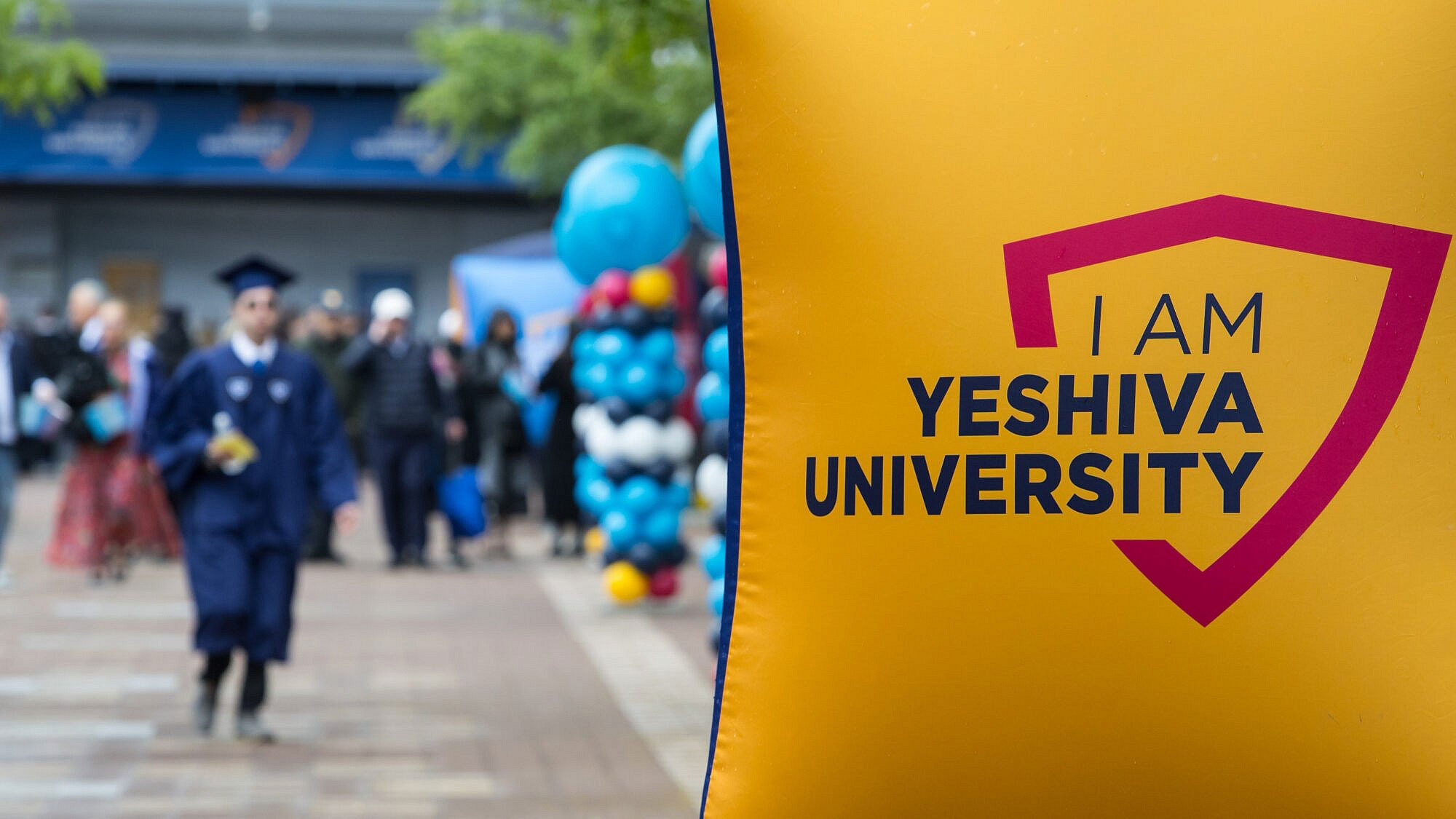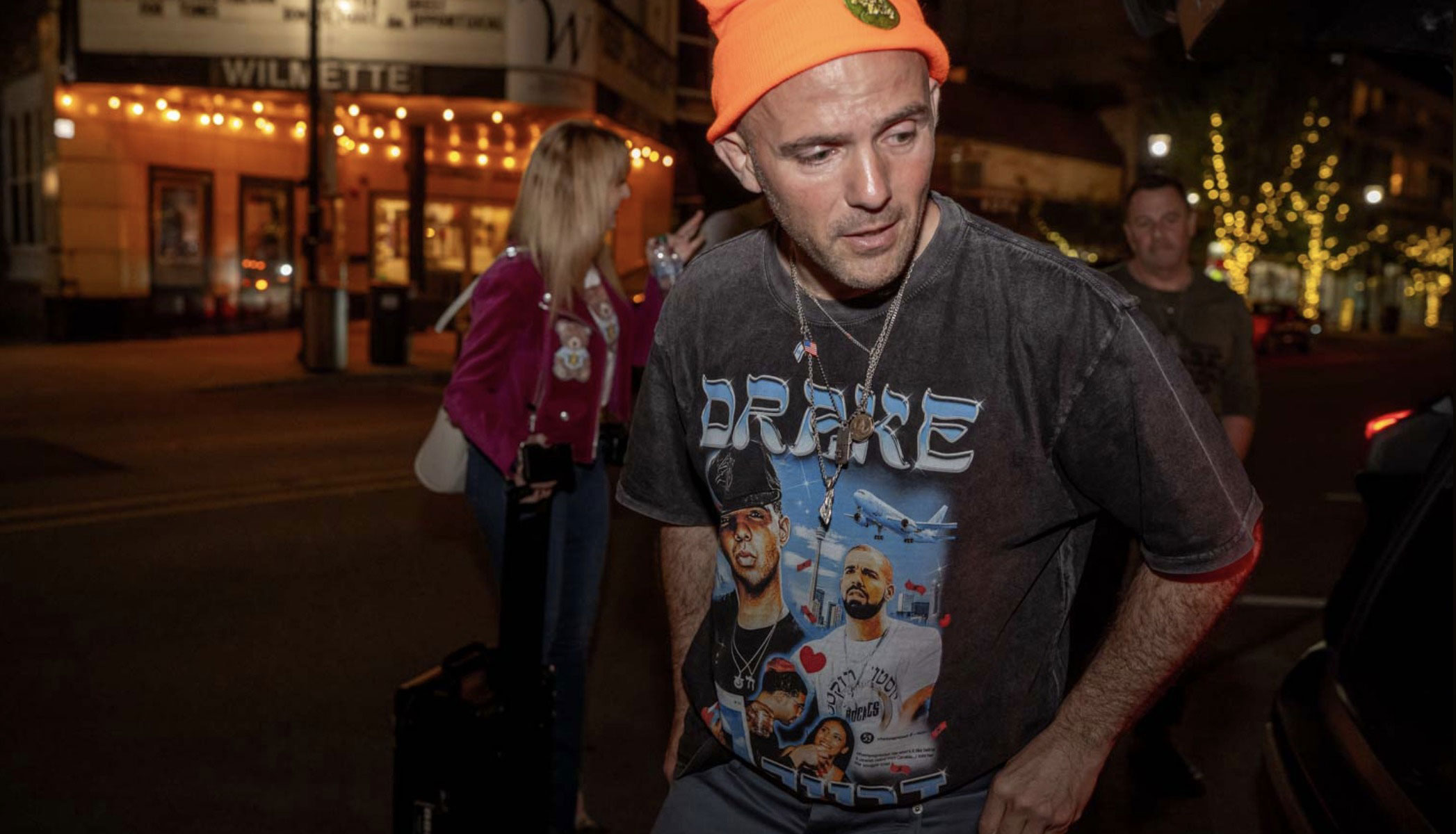Courtesy of JNS. Photo credit: Yeshiva University
Yeshiva University’s 2025 commencement at Louis Armstrong Stadium at the Billie Jean King National Tennis Center in Queens, N.Y., on May 22, 2025
(JNS) — Yeshiva University requires undergraduates who live on campus — a must for a student’s first two semesters — to agree “to live in accordance with halachic (Jewish law) norms and Torah ideals.” It also imposes an oft-ignored dress code in all academic buildings, by which women must wear “dresses or skirts that are knee-length and tops that have sleeves and a modest neckline.” Men must don “pants and a shirt.”
But the school’s recent decision to first reject, then recognize, and then seesaw again and discontinue an LGBT student club, raises some questions about the degree to which the various stakeholders in the school’s Modern Orthodox undergraduate programs agree that strict adherence to religious law ought to govern the institution in the way it has in the past.
Jonathan Sarna, the American Jewish historian at Brandeis University who is retiring after nearly 50 years of teaching, told JNS that Yeshiva has confronted circumstances similar to the present one in the past.
“YU, like so many American Jewish institutions, is happiest when it confronts issues that create no tension between ‘being Jewish’ and ‘being American,’ when the yeshivah and the university can march happily hand in hand,” Sarna told JNS. “Sadly, that is not the case with the LGBTQ question.”
The historian doesn’t expect unity “among famously discordant Jews” but hopes that there will be mutual goodwill and thinks that civility is a must.
“Just as many of us love relatives, whom we completely disagree with, so Jews need to love one another even amidst pointed disagreements,” he said. “One hopes that both sides in the YU dispute can model how intra-Jewish disputes should be carried on.”
Yeshiva and representatives of the student club, Hareni, have accused each other of operating in bad faith — a far cry from modeling ideal disputes.
“While Yeshiva worked closely and in good faith with students towards the creation of Hareni, based on rabbinically approved guidelines established in 2022, it is clear that Hareni club leaders did not enter into the agreement in the same spirit,” a Yeshiva spokesman, who declined to be named, told JNS.
“Despite all this, the administration and the roshei Yeshiva,” rabbinic faculty, “still sought to work with and guide club leaders, encouraging them to adhere to agreed-upon parameters, yet to no avail,” the spokesman said.
The Yeshiva spokesman accused Hareni’s leaders and representatives of “continuously” making “false and misleading statements that have sowed confusion regarding religious beliefs, and that are contrary to the goals that the approved guidelines set out for Hareni.”
Hareni told JNS that it is “deeply disappointed” with Yeshiva’s decision to discontinue the club. “That this effort ended not with dialogue, but with unilateral dissolution and hostility, only underscores how urgently LGBTQ students at YU need support, safety and community,” Hareni told JNS.
“That need hasn’t gone away,” the club said. “And neither have we.”
“Yeshiva will always be committed to supporting each of its undergraduate students as they seek to live fully committed and authentic halachic lives within our communities,” the spokesman said.
Just two months after Yeshiva and the Pride Alliance, a proposed student group, settled a five-year court case that resulted in the formation of an LGBT club on campus called Hareni, Yeshiva’s senior rabbinic leadership directed the university’s Office of Student Life on May 9 to officially discontinue the club.
In a letter sent to students by Yosef Kalinsky, dean of undergraduate Torah studies at Yeshiva, the school’s senior rabbis stated that Yeshiva’s undergraduate schools are “fundamentally religious” and therefore, the settlement agreement called for them to determine the club’s future.
“Recent actions and statements have indicated that Hareni is operating as a pride club under a different name and as such is antithetical to the Torah values of our yeshivah, as well as in violation of the approved guidelines and of the terms of the settlement agreement,” the rabbis stated. “There is no place for such a club in Yeshiva.”
One day beforehand, Hareni’s legal counsel sent a letter to Yeshiva expressing its “deep concern about recent public statements by Yeshiva University’s senior leaders that display animus and hostility toward the university’s LGBTQ students and may violate the terms of the settlement agreement.”
The letter from Hareni stated that violations included imposing stricter oversight on it than on other clubs, banning Hareni from holding social and recreational events and requiring Hareni to have a “‘sexual morality’ disclaimer” on all of its communications that states that “this club is for students, who seek to fully maintain traditional halachic standards of sexual morality, as defined by the Shulchan Aruch.”
Yeshiva’s rabbis also said that the club must avoid using pride flags, symbols and emojis. The former co-presidents of Hareni wrote in the student paper, the Observer, that the group plans to hold social events “just as every club at this university has the right to do” and would not put the “egregious statement” on its communications.
The letter from Hareni’s lawyers added that public statements made by the university’s senior leadership, including president Rabbi Ari Berman, and two of the school’s most senior rabbinic deans — Rabbi Hershel Schachter and Rabbi Mayer Twersky — “reflect disturbing anti-LGBTQ animus” and “communicate to our clients and other LGBTQ students they are unwelcome and unsafe on campus.”
Yeshiva’s counsel responded to Hareni’s letter on May 9, stating that the guidelines of the agreement placed the club under the authority of the university’s senior rabbis and “traditional Orthodox auspices, operating according to halachah.”
“Ironically, your letter repeatedly illustrates the fundamental and ongoing breach of the settlement agreement by your own clients,” Yeshiva stated. “Since the announcement of the club — and culminating in the event organized by your clients just last evening — your clients have misrepresented the club, ignored the guidance of the rabbis, violated the rules of the office of student life and have publicly stated that they will not follow the rabbis’ direction as to how to keep this club true to its core mission.”
Yeshiva also charged that Hareni said it would be a continuation of the Pride Alliance and kept the latter’s social media account. It added that all undergraduate clubs at the school are required to follow rabbinic guidance.
Rabbi Steve Greenberg, the founding director of Eshel, whose mission is “to build LGBTQ+ inclusive Orthodox Jewish communities,” holds rabbinic ordination and an undergraduate degree from Yeshiva. He told JNS that there has always been a tension at Yeshiva between its values of Torah umadda, loosely adhering to religious law, while being active in the secular world.
“While YU has affiliates — a law school, medical school, a business school and social-work school — that are wholly secular, there was always a tension in the college to sustain the ethos of a Yeshiva while allowing students to prepare for a career that required a secular education,” he told JNS.
“That tension has always been a defining challenge of Yeshiva University,” Greenberg said. “This is only the latest iteration of that tension.”
Of the hundreds of congregational rabbis that Eshel has interviewed, including many ordained by Yeshiva University, most are “much closer to the human realities, much more responsible for the safety and well-being of these young people and so seem better equipped to address the halachic challenges than those who sit in an ivory tower in Washington Heights,” he told JNS. (Yeshiva’s men’s campus is in the Washington Heights neighborhood of Upper Manhattan.)
“Beyond the claim of halachic impropriety, it appears that at least some of the rabbis at YU fear that the existence of such a club would have an impact on YU’s standing in the broader Orthodox world, especially in the more yeshivish communities,” Greenberg said.
To some senior Yeshiva rabbis, the new development is that “never before has there been a claim of legitimacy and even ‘pride’ in a behavior that is deemed halachically prohibited,” Greenberg said.
He thinks that “there is surely middle ground to explore” when it comes to an LGBT club at Yeshiva.
Whatever the club is called, it could be a site for Yeshiva professors or rabbinic alumni to share their thoughts on relevant issues, according to the rabbi.
“Indeed, why not invite an array of thoughtful Orthodox psychologists, theologians, philosophers and educators from both the right and the left of Modern Orthodoxy to engage the key texts and challenging questions openly?” he posed. “Isn’t that what a confident Yeshiva University would do?”
Yeshiva is a religious institution, but one that “welcomes integration into the larger world not as a mere economic necessity, but as a vote of trust in the tradition as it engages with open inquiry,” according to Greenberg.
“Yeshiva University ought to be the laboratory that it was established to become — not a museum, or worse, a mausoleum,” he told JNS. “There are many examples in the history of halachah that would nourish such an approach.”





